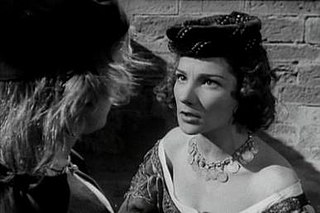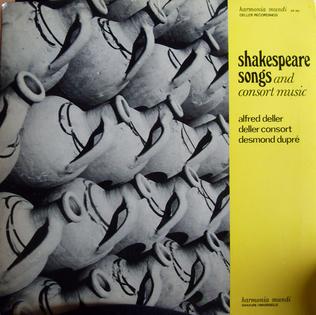Related Research Articles

Othello is a tragedy written by William Shakespeare, probably in 1603, set in the contemporary Ottoman–Venetian War (1570–1573) fought for the control of the Island of Cyprus, since 1489 a possession of the Venetian Republic. The port city of Famagusta finally fell to the Ottomans in 1571 after a protracted siege. The story revolves around two characters, Othello and Iago. Othello is a military commander of Moorish race who was serving as general of the Venetian army in defence of Cyprus against invasion by Ottoman Turks. He has recently married Desdemona, a beautiful and wealthy Venetian lady much younger than himself, against the wishes of her father. Iago is Othello's malevolent ensign, who maliciously stokes his master's jealousy until the usually stoic Moor kills his beloved wife in a fit of blind rage. Due to its enduring themes of passion, jealousy and race, Othello is still topical and popular and is widely performed, with numerous adaptations.

Otello is an opera in four acts by Giuseppe Verdi to an Italian libretto by Arrigo Boito, based on Shakespeare's play Othello. It was Verdi's penultimate opera, first performed at the Teatro alla Scala, Milan, on 5 February 1887.

Alfred George Deller, CBE, was an English singer and one of the main figures in popularising the return of the countertenor voice in Renaissance and Baroque music during the 20th century.

Iago is a fictional character in Shakespeare's Othello. Iago is the play's main antagonist, and Othello's standard-bearer. He is the husband of Emilia, who is in turn the attendant of Othello's wife Desdemona. Iago hates Othello and devises a plan to destroy him by making him believe that Desdemona is having an affair with his lieutenant, Michael Cassio.

Desdemona is a character in William Shakespeare's play Othello. Shakespeare's Desdemona is a Venetian beauty who enrages and disappoints her father, a Venetian senator, when she elopes with Othello, a Moorish man several years her senior. When her husband is deployed to Cyprus in the service of the Republic of Venice, Desdemona accompanies him. There, her husband is manipulated by his ensign Iago into believing she is an adulteress, and, in the last act, she is murdered by her estranged spouse.

Brabantio is a character in William Shakespeare's Othello. He is a Venetian senator and the father of Desdemona. He has entertained Othello in his home countless times before the play opens, thus giving Othello and Desdemona opportunity to fall in love. He is furious upon learning they have eloped, and Desdemona's decision is reported to be the cause of his death in the last act. The character has no counterpart in Shakespeare's source material for the play and is apparently the Bard's complete invention. He appears in the first act only and is mentioned in the fifth.

Othello is a 1965 film based on the National Theatre Company's staging of Shakespeare's Othello (1964-1966) staged by John Dexter. Directed by Stuart Burge, the film starred Laurence Olivier, Maggie Smith, Joyce Redman, and Frank Finlay, who all received Oscar nominations, and provided film debuts for both Derek Jacobi and Michael Gambon.

Otello is an opera in three acts by Gioachino Rossini to an Italian libretto by Francesco Berio di Salsa after William Shakespeare's play Othello, or The Moor of Venice; it was premiered in Naples, Teatro del Fondo, 4 December 1816.
Goodnight Desdemona is a 1988 comedic play by Ann-Marie MacDonald in which Constance Ledbelly, a young English literature professor from Queen's University, goes on a subconscious journey of self-discovery.

The Fairy-Queen is a semi-opera by Henry Purcell; a "Restoration spectacular". The libretto is an anonymous adaptation of William Shakespeare's comedy A Midsummer Night's Dream. First performed in 1692, The Fairy-Queen was composed three years before Purcell's death at the age of 35. Following his death, the score was lost and only rediscovered early in the twentieth century.

Emilia is a character in the tragedy Othello by William Shakespeare. The character's origin is traced to the 1565 tale, "Un capitano Moro" from Giovanni Battista Giraldi Cinthio's Gli Hecatommithi. There, the character is described as young and virtuous, is referred to simply as the ensign's wife, and becomes Desdemona's companion in Cyprus. In Shakespeare, she is named Emilia, is the wife of Othello's ensign, Iago, and is an attendant to Othello's wife, Desdemona. While considered a minor character in the drama, she has been portrayed by several notable actresses on film, with Joyce Redman receiving an Academy Award nomination for her performance.

Bianca is a fictional character in William Shakespeare's Othello (c. 1601–1604). She is Cassio's jealous lover. Despite her brief appearance on stage, Bianca plays a significant role in the progress of Iago's scheme to make Othello believe that his wife Desdemona is cheating on him with Cassio. Bianca is traditionally regarded as a courtesan, although this occupation is not specifically designated in the drama. The character was occasionally cut from performances in the 19th century on moral grounds. Bianca is not to be confused with Bianca Minola in Shakespeare's The Taming of the Shrew.

Othello is a character in Shakespeare's Othello. The character's origin is traced to the tale "Un Capitano Moro" in Gli Hecatommithi by Giovanni Battista Giraldi Cinthio. There, he is simply referred to as the Moor.

Otello is a 1986 film based on the Giuseppe Verdi opera of the same name, which was itself based on the Shakespearean play Othello. The film was directed by Franco Zeffirelli and starred Plácido Domingo in the title role, Katia Ricciarelli as Desdemona and Justino Díaz as Iago. For the movie's soundtrack, Lorin Maazel conducted the Orchestra and Chorus of the Teatro alla Scala. The film premiered in West Germany on 28 August 1986 and received a U.S. theatrical release on 12 September 1986. It was nominated for a Bafta Award and a Golden Globe for Best Foreign Language Film.

Venice is a musical collaboration between Matt Sax and Eric Rosen. The plot focuses on a dystopian near-future fictional city named Venice. The show opened at the Copaken Stage in Kansas City in 2010 as a co-production between Kansas City Rep and Center Theatre Group. Venice also ran at the Public Theater in New York from May 28 through June 30, 2013. The cast of Venice at The Public includes Uzo Aduba, Jennifer Damiano, Jonathan-David, Claybourne Elder, Leslie Odom, Jr., Victoria Platt, Angela Polk, Matt Sax, and Haaz Sleiman.
Othello error occurs when a suspicious observer discounts cues of truthfulness. Essentially the Othello error occurs, Paul Ekman states, "when the lie catcher fails to consider that a truthful person who is under stress may appear to be lying", their non-verbal signals expressing their worry at the possibility of being disbelieved. A lie-detector or polygraph may be deceived in the same way, by misinterpreting nervous signals from a truthful person. The error is named after William Shakespeare's tragic play Othello; the dynamics between the two main characters, Othello and Desdemona, are a particularly well-known example of the error in practice.

The figure of Othello from the tragic play by William Shakespeare has appeared in many examples in art and culture since being authored by Shakespeare in the early 16th century.

Shakespeare Songs is a 1967 LP album of Elizabethan songs which is one of the most celebrated recordings of the countertenor Alfred Deller. Deller is accompanied by lutenist Desmond Dupré and the Deller Consort, Philip Todd and Max Worthley tenors, Maurice Bevan baritone.
Iago is a major character in William Shakespeare's 1607 play Othello. His role is one of Othello's outwardly loyal courtier and friend, who in fact hates him and schemes his downfall. He also manipulates his friends and master into doing his bidding, eventually persuading Othello to believe that his wife, Desdemona, has been having an affair, resulting in Othello killing her in a jealous rage.

The First Book of Songs is a collection of songs by John Dowland which includes one instrumental piece. The book was published in London in 1597.